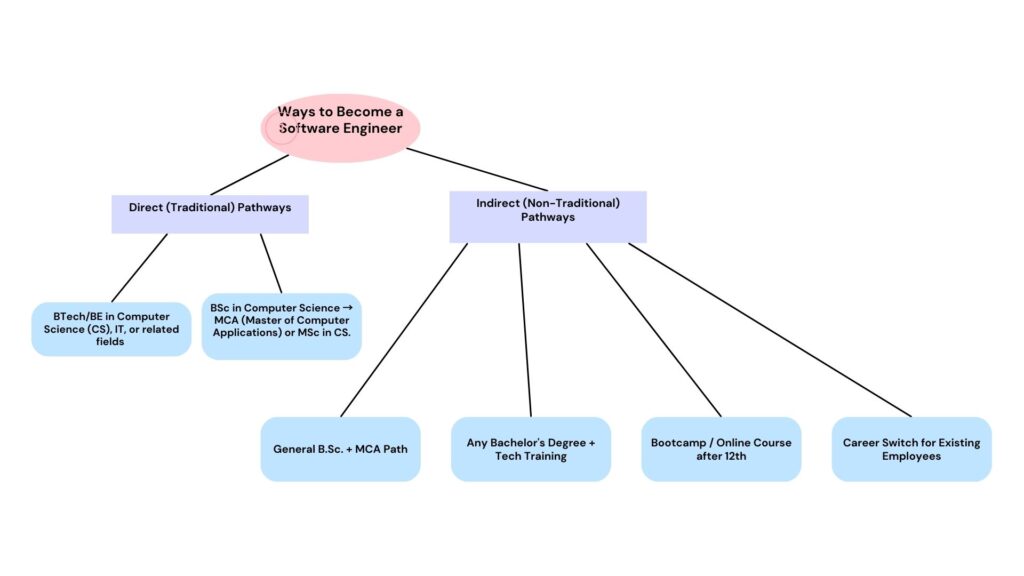Becoming a software engineer is a dream for many — and for good reason. The role is well-paying, offers excellent growth potential, and allows individuals to work on cutting-edge technology that impacts millions of people. However, the journey to becoming a software engineer is not the same for everyone.
This comprehensive guide explores both direct and indirect paths to becoming a software engineer, catering to students, graduates, career switchers, and working professionals from non-technical fields. Whether you’re just out of school or working in a completely different industry, this blog will give you a roadmap to break into the software world.
Why Choose a Career in Software Engineering?
Before we explore how to become one, let’s understand why this career path is so appealing:
- High Demand: With the tech industry booming, software engineers are in constant demand across industries, from startups to multinational companies.
- Excellent Pay: Software engineers are among the top earners in the job market.
- Global Opportunities: The skills are globally transferable, allowing remote work and international jobs.
- Creative and Analytical Work: Software engineering blends logic with creativity to build apps, websites, games, and systems.
- Impact: You can solve real-world problems and create solutions used by thousands or even millions of users.

Two Main Routes to Becoming a Software Engineer
There are two primary paths to becoming a software engineer:
- Direct Way: Following a formal academic route, usually through technical education.
- Indirect Way: Entering the field through non-traditional or alternate means such as bootcamps, self-study, or transitioning from other careers.
Let’s explore both in detail.
1. Direct Way to Become a Software Engineer
1.1 Pursuing BTech in Computer Science or a Related Branch
This is the most popular and structured route, offering in-depth exposure to core computer science concepts over four years.
What You Learn:
- Programming languages like C, C++, Java, Python
- Data structures and algorithms
- Database Management Systems (DBMS)
- Operating Systems
- Computer Architecture
- Networking and Cybersecurity
- Software engineering principles
Why It Works:
- Strong theoretical foundation
- Hands-on lab sessions and projects
- Internship opportunities
- On-campus placement assistance
Real-World Example:
Rahul, who completed BTech in Computer Science, got placed in Infosys through campus placement and is now working on cloud-based enterprise applications.
1.2 BSc in Computer Science + MCA or MSc in Computer Science
This path is often chosen by those who may not get into engineering but still want to pursue software development.
Path Structure:
- BSc (3 years): Focuses on basic programming, mathematics, and theory.
- MCA/MSc (2–3 years): Specialization in software development, advanced programming, and system design.
Benefits:
- Opportunity to switch to tech post graduation
- More mature understanding of tech concepts
- Some universities offer strong placement support during MCA
Ideal For: Students with a keen interest in technology but not from engineering institutes.
2. Indirect Way to Become a Software Engineer
Not everyone starts with a computer science degree — and that’s okay. Many successful engineers come from completely different academic and professional backgrounds.
2.1 BSc in General Stream + MCA
If you have a BSc degree in Physics, Chemistry, or Math and had Mathematics in 10+2, you are eligible to apply for MCA programs in most universities.
How It Works:
- Use your analytical background from science.
- Learn software fundamentals in MCA.
- Build projects and gain internship experience.
Common Entry Exams: NIMCET, MAH MCA CET, CUET-PG
Note: MCA is equivalent in weight to many MTech programs when it comes to software roles.
2.2 BSc or BA + Technical Courses (Non-IT Degree Holders)
Many graduates from Arts or non-tech Science streams develop an interest in programming later on.
What You Can Do:
- Take online courses in web development, JavaScript, Python, etc.
- Enroll in coding bootcamps or offline tech schools
- Build projects, open-source contributions, or freelance gigs
Course Platforms:
- Coursera, Udemy, edX
- Scaler Academy, Masai School, Newton School
- FreeCodeCamp, The Odin Project (free resources)
Tip: Create a GitHub profile with your code samples and build a portfolio website to showcase your projects.
2.3 Join Bootcamps or Online Courses After High School
For those who don’t pursue college (or need quicker routes due to constraints), bootcamps and structured online courses can be game changers.
Popular Bootcamps:
- Masai School (India)
- Le Wagon
- General Assembly
- Coding Dojo
These offer:
- Structured training in web development, backend, mobile apps
- Career support and interview prep
- Real-world projects and teamwork experience
Warning: While bootcamps are intensive, success requires dedication and self-discipline. It’s not easy, but it’s very possible.
2.4 Switch from Non-Technical Role to Software Engineering (Internal Transition)
Already working in the IT industry but not in a technical role? You can still switch roles.
Example Roles: Tech Support, QA Tester, IT Admin, Product Support, HR
Steps to Switch:
- Identify the area you want to work in: Web, Backend, Mobile, DevOps.
- Start learning relevant skills using online resources.
- Speak to your manager about internal upskilling programs.
- Shadow developers or volunteer for small technical tasks.
- Build and show your own projects.
Tip: Many companies support lateral transitions internally. They may even sponsor certification programs if you show initiative.
Skills Every Aspiring Software Engineer Should Develop
Regardless of how you enter the field, here are some non-negotiable skills every software engineer should master:
1. Programming Languages
Start with Python or JavaScript for ease, then move to C++, Java, or frameworks like Node.js, React, Django, etc.
2. Data Structures and Algorithms
The backbone of problem-solving in programming. Crucial for cracking technical interviews.
3. Version Control
Learn Git and GitHub to manage code and collaborate with others.
4. Database Knowledge
Understanding SQL (MySQL, PostgreSQL) and NoSQL (MongoDB).
5. Operating Systems and Networking
Know the basics of how OS and computer networks function.
6. Software Development Life Cycle (SDLC)
Understanding how software moves from idea to release: Agile, Scrum, testing, deployment.
7. Soft Skills
Teamwork, communication, curiosity, and time management are critical for success in tech teams.
Certification & Specialization Suggestions
To enhance your resume, you can take additional certifications:
- Google IT Automation with Python
- Microsoft Azure Fundamentals
- AWS Certified Developer
- Oracle Certified Java Developer
- FreeCodeCamp Certifications (free but highly respected)
Frequently Asked Questions (FAQ)
Q: Do I need a degree to become a software engineer?
Not necessarily. A degree helps, but what matters most is your ability to build projects and solve problems.
Q: Can I learn software engineering on my own?
Yes, many self-taught developers work in top companies. But it requires consistency and a learning plan.
Q: Which programming language should I start with?
Python is beginner-friendly. Once comfortable, move on to JavaScript, Java, or C++ depending on your interest.
Q: How long does it take to become a software engineer?
It depends on your path. A college degree takes 3–4 years. Bootcamps may take 6 months to 1 year. Self-learning can vary.
